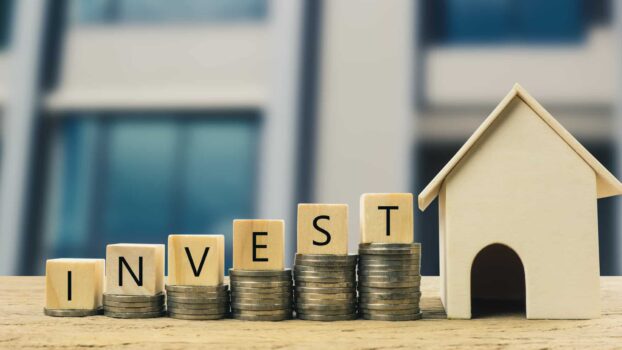Investment Property Mortgage Rates
Rental Property Mortgage Rules
October 5, 2022Investment Property Mortgage Broker
October 5, 2022
Real estate is always regarded as a profitable investment. Initially, income from investment properties was considered a secondary source of income. However, they can now be sufficiently profitable to serve as a primary source of income. This means you can consider making a direct living out of it. But, there is a catch, and that drawback is that investment property loans have higher interest rates, which makes them more challenging to obtain.
One of the various methods to provide income and long-term wealth is purchasing an investment property, often known as an income or rental property. As with any investment, there are dangers associated with purchasing and owning this kind of property, and financing requirements differ considerably from those for a permanent house.
The interest rates that lenders charge on loans for investment properties are known as Investment Property Mortgage Rates. Your credit score and financial background, including the amount of your down payment, will affect the rate you receive. Generally speaking, the better your rate will be, the higher your credit score and the larger down payment you can make. If you buy an investment property at the right price and with sufficient financing, it can generate cash flow for you immediately.
In this article, we’ll look at the current mortgage rates on investment properties, explain how to calculate them, and show you how to secure a lower mortgage for your rental property. But before we get started, you need a deeper understanding of investment mortgage rates and why they are higher on investment properties. Without much further ado, let’s get into it.
Why Are Interest Rates Higher On Investment and Rental Properties?
It is usually more difficult to obtain a lower mortgage rate for an investment property than for a permanent residence. This is because lenders impose higher fees on “non-owner-occupied” transactions, which relate to real estate that is not for your use. As a result, investment properties typically have higher mortgage rates.
Single-family building investment property mortgage rates are roughly 0.50% to 0.75% higher than owner-occupied dwelling loan rates. Expect the lender to raise your interest rate by at least 0.125% to 0.25% if you buy a 2-4 unit structure.
Higher risk is the simplest explanation for why loan rates are higher on investment and rental houses than on owner-occupied homes. According to logic, an owner-occupier will make every effort to make regular mortgage payments to safeguard their source of physical shelter.
Even though investors have an emotional attachment to their rental and investment properties, the market believes investors are more likely to bail out a deal if things don’t work out.
Even though interest rates have risen, investing in real estate is still considered a smart move in the long run. The amount you should budget to pay today to fund that future cash flow is discussed as follows.
What Are Today’s Investment Property Mortgage Rates?
Rates for homes used as investments are typically 0.5–0.75% higher than ordinary rates. With today’s average rate for a primary residence being 6%, buyers should expect loan rates to start at 6.5% to 6.75% for a single-unit investment property. Additional requirements may include a credit score of 740 and a 30% down payment for the normal rates of today’s borrowers who meet the requirements for prime borrowers.
Your interest rate will probably be more significant than what you see advertised if you have poor credit or a small down payment. Although a 25% down payment is ideal, a 20% down payment is typically required. Average rates ought to only be utilized as a benchmark. Your investment property rate will vary, so try to compare quotes from different lenders to find the best deal.

How High Are Mortgage Rates for Investment Properties?
Investment mortgage interest rates for investment properties will always be higher than those for your primary residence. How much higher? Well, the type of investment property you’re purchasing, your credit score, and the amount of your down payment all play a role in answer to that query.
As a general rule, though, you should expect the interest rate on your investment property to be between 0.50% and 0.75% more than the rate on your home mortgage. In general, the interest rates for investment loans should be 0.50% to 0.75% higher than the interest rates on your standard mortgage. Therefore, the interest rate on a rental property would be in the range of 6.5% to 6.75% (6.572% to 6.822% APR). For instance, suppose the current 30-year fixed rate is 6% (6.072% APR) as of September 30, 2022.
Lenders charge this extra fee because they see mortgages for rental and investment homes as riskier lending products. Mortgage borrowers are more prone to default on their rental properties than on their personal residences when times are tough. Therefore, these mortgage loans are more likely to default during challenging economic times. In order to protect themselves against the increased risk involved in financing investment properties, lenders place stricter qualification standards on potential borrowers and demand a higher interest rate. Due to this, shopping around and ensuring you are getting a fair mortgage rate on your investment home before you buy is even more important and should not be taken lightly.
How to Calculate Investment Property Loan Rates
Your mortgage lender has some discretion over the interest rate they charge. Mortgage lenders frequently make rate changes to meet Freddie Mac and Fannie Mae standards. Fannie and Freddie, whose fees directly impact the interest rate you ultimately pay and regulate the majority of mortgages in today’s market.
Due to the additional risk involved, Fannie Mae and Freddie Mac charge higher fees for transactions involving the acquisition or refinancing of investment properties. As a result of their expenses, your interest rate will increase.
For an investment property loan with a 20% down payment, a fee equal to 3.375% of the loan amount would be required. This is just the same as taking out a $3,375 loan for $100,000. The borrower pays a higher interest rate than additional funds for closing costs. What impact do these costs have on your final price, then?
In this case, the 3.375% in investment property loan fees can be covered by adding an extra 0.5% to 0.75% to the rate. You should be aware that this is for a single-family home. For instance, buying a duplex might result in an increase in rates of 0.125% to 0.250% or an additional cost of 1.0%. Loan experts suggest you pay at least 25% to get the best rates. A loan-to-value ratio of 75% or less is recommended for investment acquisitions.

What Affects Your Investment Property Interest Rate?
Your investment property mortgage rate is affected by various factors in addition to those outlined by Freddie Mac and Fannie Mae. Additionally, additional factors for each component have an impact on mortgage rates. The top seven factors that affect your interest rate that you need to be aware of are listed below.
1. Credit scores
One element that may impact your interest rate is your credit score. Consumers with better credit scores typically pay lower interest rates than those with worse credit ratings. In addition, your credit scores help lenders determine how likely you are to repay a loan. Your credit report, which contains details about your credit history, including your loans, credit cards, and payment history, is the basis for calculating your credit score.
Checking your credit and looking over your credit reports for problems should be your first step before beginning the mortgage application process. It would help to dispute any mistakes you uncover with the credit reporting agency.
Your credit score may decrease due to an inaccuracy on your report, which may keep you from being approved for loans with better interest rates and terms. Checking your credit early in the process is advised because correcting inaccuracies on your credit reports may take longer than expected.
2. Home location
Several lenders offer slightly different interest rates depending on your state. Therefore, you must tell us your state and, based on the loan size and type, your county to receive the most accurate rates from us at Aurum and Sharpe.
We are always available to help you fully help you comprehend the rates available if you are planning to buy in a rural region. Still, it would be best if you shopped around with several lenders, including local lenders. Different lending institutions may provide loans with various terms and prices. So whether you want to buy a home in a rural or metropolitan region, speaking with many lenders will help you understand your possibilities.
3. Home price and loan amount
The purchase price of the home plus closing expenses less your down payment equals the amount you will need to borrow for your mortgage loan. Your closing expenses and mortgage insurance might also be factored into the total amount of your mortgage loan, depending on your situation or the type of mortgage loan you have. On exceptionally modest or substantial loans, buyers of homes may be required to pay higher interest rates.
If you’ve already begun looking at houses, you might have a general notion of the price range of the residence you intend to purchase. In addition, real estate websites might assist you in learning about average pricing in the areas you’re interested in if you’re starting.
4. Down payment
Lenders will typically require you to purchase mortgage insurance, also known as private mortgage insurance if you cannot put down a down payment of 20% or more (PMI). Mortgage insurance raises the total cost of your monthly mortgage loan payment by safeguarding the lender if a borrower defaults on their loan. Since lenders perceive a lesser degree of risk when you invest more in the property, a more significant down payment typically translates into a cheaper interest rate; therefore, you’ll typically get a lower interest rate if you can safely put down 20% or more.
If you research prospective interest rates, you might discover that a down payment of less than 20% could result in a somewhat lower interest rate than one of 20% or more. The reason for this is that your payment of mortgage insurance reduces the risk to your lender. It would help if you considered the entire cost of a mortgage. The total cost of borrowing is lower than the higher the down payment. Over time, getting an interest rate reduction can help you save money.
When you shop around, be careful enough to account for all of the loan costs to avoid any expensive surprises. But even if you can acquire a loan with a down payment of less than 20%, your overall borrowing costs will probably be higher because you’ll have to pay the additional monthly mortgage insurance payments. So you should consider the overall cost of borrowing rather than just the interest rate.
To determine how different down payments may affect your mortgage interest rate and the total amount of interest you’ll pay throughout the loan, have a profitable business complimentary meeting with one of our experts at Aurum and share right now!
5. Loan term
How long you have to repay the loan depends on its term or duration. Shorter term loans typically feature higher monthly payments but lower interest rates and total costs. But, again, much relies on the specifics; the length of the loans you’re considering and the interest rate will determine how much lower the amount you’ll pay in interest and how much higher the monthly payments may be.
Learn more about the length of your loan, and then talk to one of our certified and reliable experts at Aurum and Sharpe to experiment with different options to see how the length and interest rate of your loan would affect your interest costs. They are always available to help you explore various options that are favorable to you.
6. Interest rate type
There are two primary categories of interest rates: fixed and adjustable. Over time, fixed interest rates remain constant. However, adjustable rates may fluctuate each period after an initial fixed period depending on the market.
An adjustable-rate loan may have an initial interest rate lower than a fixed-rate loan, but that rate may rise dramatically. So first, learn more about the various interest rates, and then contact us now at Aurum and Sharpe to see how this decision impacts interest rates.
7. Loan Type
Mortgage loans can be divided into several major categories: conventional, FHA, USDA, and VA. They choose the goods lenders offer, and different loan types have varied qualifying standards.
Rates may vary depending on the type of loan you choose. You will better know all your options after speaking with many lenders. Your interest rate is determined by all of these factors, not just one. Due to the uniqueness of every person’s situation, we allow investors to speak to one of our workers at Aurum and Sharpe so that they can discover what to anticipate depending on each person’s circumstances.
By being aware of these elements, you’ll be well prepared to shop for the ideal mortgage loan and interest rate for your needs. Not all of these variables are under your direct control. But knowing how your mortgage interest rate is calculated has more importance than you probably think, making you a more informed borrower as you shop around.

How To Reduce Your Investment Mortgage Interest Rate
It might be challenging to avoid paying high-interest rates on investment real estate. However, you can take measures to ensure you receive the best value.
· Make a more significant down payment
The best way to guarantee a lower interest rate on your investment property is to put more money down. A significant extra cost is eliminated if you can make at least 20% as a down payment.
· Improve your credit score
Due to the lower monthly payments, the property buyer with a stronger credit score may be able to offer tenants a higher rental fee. This real estate investor could earn more cash flow thanks to the lower monthly payment.
· Shop around
We suggest comparing interest rates from at least 3-5 different institutions before choosing a lender to finance your investment property.
Bottom Line
Expending money on a rental or investment property with hopes of future returns is a great way to expand one’s portfolio and generate income. Real estate that generates income pays off with regular rent payments and later property appreciation and tax advantages. These benefits are challenging to find with other investments.
As much as the advantages are much, so also are the limitations of interest rates, but the advantages are higher. You need to note the above factors that can affect your interest rate to avoid a higher interest rate when investing in a rental property. Knowing these factors is germane to the profitability of your investment. If you have any problems with any of the factors mentioned above, feel free to speak to one of our experts at Aurum and Sharpe to put you through and walk you through the process of getting a lower investment mortgage rate.
Mortgage Rates
DSCR Mortgage: 7.375%
Commercial Mortgage: 7.5%
Single family, Condo Investment Property: 7.375%
Portfolio of Residential Homes: 7.5%
Calculate Your Monthly Payment
Mortgage Information
Monthly Payment
Principal and Interest: $0
Total Monthly Payment: $0


